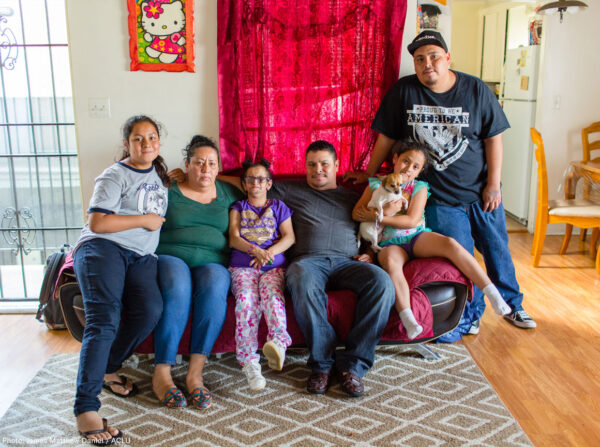ACLU Seeks to Certify Nationwide Class of DACA Recipients and Requests Class-wide Injunction
LOS ANGELES — The American Civil Liberties Union and the ACLU Foundation of Southern California filed motions today to certify a nationwide class of Deferred Action for Childhood Arrivals recipients and to seek a class-wide preliminary injunction to stop the federal government’s practice of arbitrarily revoking individual grants of DACA protections for young immigrants.
The case, IEIYC v. Nielsen, argues that the Department of Homeland Security has abruptly terminated numerous immigrants’ DACA grants and work permits based on unproven allegations or low-level offenses that do not disqualify the individual from maintaining DACA status. DHS terminates DACA status in these cases without any advance notice, any chance to fight the government’s actions, or any opportunity to reinstate DACA when an individual is cleared of any allegations.
Katrina Eiland, a staff attorney with the ACLU, said, “The Trump administration has not only decided to end the DACA program, but it is now taking aim at what temporary protection remains for these young immigrants. This is a shoot first, ask questions later approach that is indefensible when the lives of so many young immigrants are directly at stake. This is why we are asking the court to intervene, and why Congress must also enact a permanent solution.”
Counsel also amended its complaint in the case to add two new plaintiffs, in seeking restoration of the plaintiffs’ DACA grants and work authorizations. The case was originally filed on behalf of Jesús Alonso Arreola Robles, as well as the Inland Empire Immigrant Youth Collective (“IEIYC”), a grassroots and advocacy organization. In November, the federal district court in California issued a preliminary injunction ordering the government to restore Arreola’s DACA grant and employment authorization.
Andrés Kwon, attorney and Equal Justice Works Emerson fellow at the ACLU of Southern California, said, “This class action lawsuit is about ensuring that the Trump administration and individual immigration officers are not left to their own devices. For one, being undocumented is not a valid reason to end one’s DACA. And there are processes the government must follow. They cannot arbitrarily target individual DACA recipients who have done nothing that disqualifies them from DACA and unlawfully terminate their DACA.”
Lorella Praeli, director of immigration policy and campaigns at the ACLU, said, “The Trump administration has engaged in a disturbing pattern of improperly revoking DACA and targeting young immigrants through unjust enforcement practices. The troubling details in the stories of José and Ronan add to those of Jesús Arreola, Rosa Maria Hernandez, Jessica Colotl, and other young Dreamers and DACA recipients targeted by the Trump administration throughout the year. Their stories offer reminders why Congress needs to pass the Dream Act without delay and underscores the urgent reason why Congress must act.”
One of the new plaintiffs, José Eduardo Gil Robles, is a resident of Coon Rapids, Minnesota, and a former altar server at his local Catholic church who has lived in the United States since age five. Robles received a DACA grant and work permit in 2015 and again in August 2017, which he relied on to work full time as a baker and then for a logistics company. In September 2017, Robles was pulled over by police and charged with driving on a cancelled license. He was quickly released, but in October, Immigration and Customs Enforcement agents showed up at Robles’ work and arrested him, detained him, and initiated deportation proceedings against him. In November, U.S. Citizenship and Immigration Services (USCIS) terminated his DACA grant and work permit without any notice or even an opportunity to respond.
“I couldn’t understand why they put me in deportation proceedings since I had been granted a two-year DACA renewal just two months before,” Robles said. “And a minor traffic offense like driving on a cancelled license is not supposed to disqualify someone from DACA. Everything is more difficult after losing my DACA, both because I am not able to work, and because I don’t know what will happen to me next.”
The second new plaintiff, Ronan Carlos De Souza Moreira, lives in Kennesaw, Georgia, and has resided in the U.S. since 2006, when he arrived with his family from Brazil. Moreira grew up in Marietta, Georgia, and was active in school sports and clubs, serving as a youth leader at his church. Moreira received grants of DACA in 2013, 2015, and in 2017, and worked as an installation manager at a flooring company. In early November, Moreira was arrested when a police officer believed that the expiration date on his driver’s license had been altered. Though he quickly posted bond, ICE detained him and initiated deportation proceedings. USCIS terminated Moreira’s DACA and work permit with any notice or chance to respond. Without DACA, Moreira said, “I can’t plan for my future, and the uncertainty makes me feel hopeless and depressed.”
More information about the class action lawsuit is available online here:
/cases/inland-empire-immigrant-youth-collective-v-duke


